The minor pentatonic scale is probably the most commonly learned, practiced and used scale by guitarists of all genres. This scale is a must-know melodic device for guitarists exploring the world of improvised music, be it in the jazz genre or otherwise.
While many of us learn this scale when first checking out soloing techniques in genres such as rock, blues and pop, we often neglect this scale when it comes to jazz guitar soloing techniques. The minor pentatonic scale can be an effective and fun way to bridge the gap between your rock and blues soloing ideas.
In this lesson, you will learn how to build, play, practice and solo with the minor pentatonic scale in a jazz guitar setting.
Lesson Content
- What is a Pentatonic Scale?
- The Pentatonic “Blues” Scale
- Minor Pentatonic Scale Construction
- Minor Pentatonic Scale Fingerings
- Minor Pentatonic Scale Patterns
- Minor Pentatonic Scale Licks
- Applications of the Pentatonic Minor Scale in Jazz
- Minor Pentatonic Over 2-5-1 Chord Progressions
- Minor Pentatonic Over Minor 2-5-1 Chord Progressions
- Pentatonic Sidestepping
- Pentatonic Enclosures
- Minor Pentatonic Scale Songs
- More Scale Lessons
Pentatonic Scale Definition
What is a pentatonic scale?
A pentatonic scale is a scale that contains 5 notes.
Any scale that contains 5 notes can be called pentatonic, but when people talk about pentatonic scales they refer to either the minor pentatonic scale or the major pentatonic scale. This lesson is about the minor pentatonic scale.
The Pentatonic Blues Scale
I often hear students talk about the “pentatonic blues scale”, but there is no such thing as the pentatonic blues scale. A pentatonic scale is a scale with 5 notes, while the blues scale is a scale with 6 notes, also known as a hexatonic scale.
Blues scale = minor pentatonic scale + blue note (#4)
So, if you hear someone talking about the pentatonic blues scale, they are actually talking about the minor blues scale or the major blues scale.
Minor Pentatonic Scale Construction
To begin, let’s take a look at the interval structure of the minor pentatonic scale so that you will have an understanding of how this popular scale is built from a theoretical standpoint. The minor pentatonic scale consists of the 1, b3, 4, 5 and b7 of the natural minor scale (the Aeolian mode).
The interval structure and formula are as follows:
| A Minor Pentatonic | A | C | D | E | G |
|---|---|---|---|---|---|
| 1 | b3 | 4 | 5 | b7 |
As you can see, this scale has the b3 and b7 notes, along with the perfect intervals of the major scale (1-4-5). Because of this, you can use this scale to outline minor chords, as well as bring a blues flavor to major chords in your soloing.
Here is how that scale looks on tab with the root-note A:

Because the minor pentatonic scale is so versatile, you can apply it to the following types of chords fairly easily in your soloing:
- Major triads
- Maj7 chords
- 7th chords
- Minor triads
- m7 chords
You can see that this scale can be used over the three chords that make up the ii V I progression, the most commonly used in jazz, and therefore it’s a great choice for soloing over these changes in your playing, as we’ll see later on in this lesson.
Minor Pentatonic Scale Fingerings
Now that you know the interval structure of this scale, let’s look at the five most common fingerings (aka shapes) for the minor pentatonic scale on the guitar.
Learn the first scale position first (in 12 keys around the fretboard), before moving on to the other four fingerings:

Minor Pentatonic Scale Patterns
After you have memorized the fingerings in the previous section, you can work on common melodic patterns through these scales in order to expand your vocabulary and gain soloing ideas at the same time.
Minor Pentatonic Pattern 1
In this classic pentatonic pattern, you will play the A minor pentatonic scale in groups of 3 notes. Start on the first note of the scale and play 3 notes up, go back one note, play 3 notes up, go back one note, and so on…
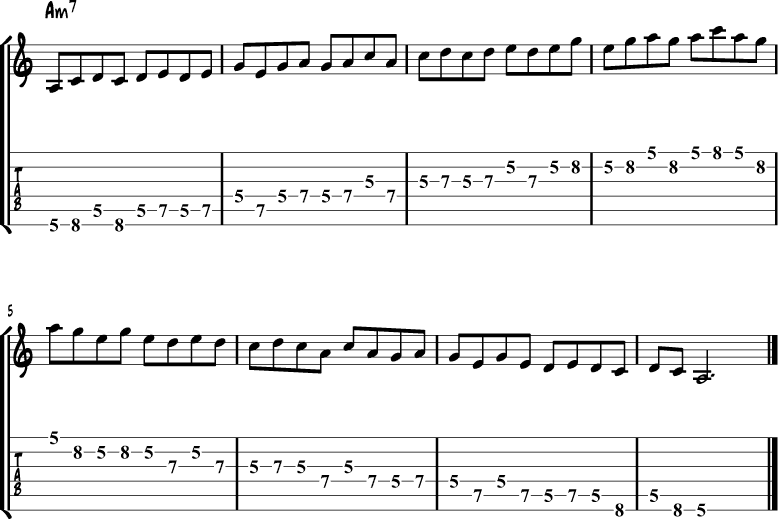
Minor Pentatonic Pattern 2
In this pattern you will also play the scale in groups of 3, but this time in reverse. Start on the third note of the scale (D), play 3 notes down, go to the next note, play 3 notes down, and so on…

Minor Pentatonic Pattern 3
In the next pentatonic pattern, you will play the scale in groups of 4.
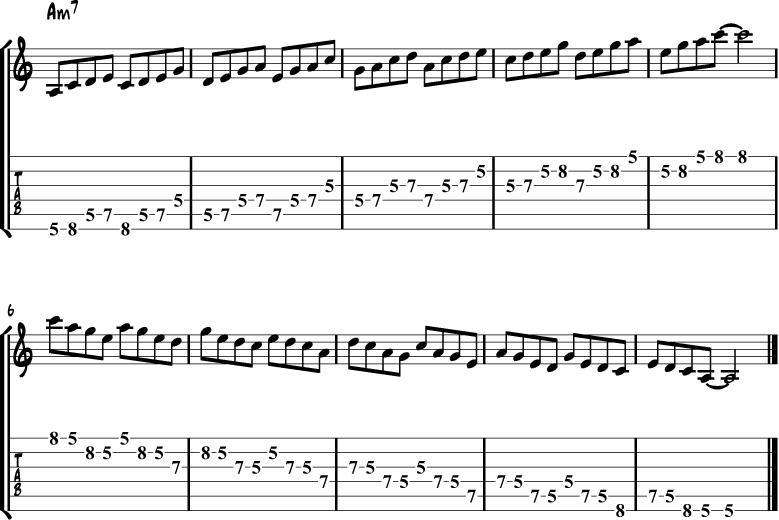
Minor Pentatonic Pattern 4
In this pattern, you will play the scale in groups of 5.

Minor Pentatonic Pattern 5
In the next pattern, you will play the pentatonic scale in 5ths, like the opening phrase of Pat Metheny’s Bright Size Life.

Minor Pentatonic Pattern 6
This next scale pattern is a favorite of many modern jazz guitarists and is built by playing down the “right side” of the scale, and then up the “left side” of the scale. When doing so, you create a snake-like pattern that winds its way through the scale.
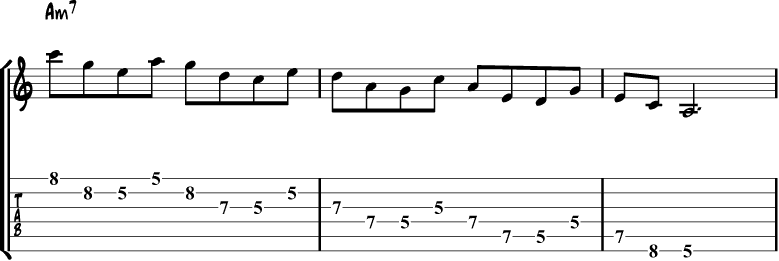
As was the case with the five fingerings you learned in the last section, you can put on an A7 or Am7 backing track and practice soloing over those chords using one or more of the patterns in this section of the lesson.
When soloing with these patterns, you can change the rhythms of each pattern, add some other notes from the scale, take notes away and add rests to the pattern etc. as you make the patterns more musical and less technical.
Minor Pentatonic Scale Licks
As well as practicing scale patterns, you should also learn common licks and phrases that you can apply to your jazz guitar solos.
Minor Pentatonic Lick 1
This first lick is a good technical exercise to get the root position of the minor pentatonic scale under your fingers.
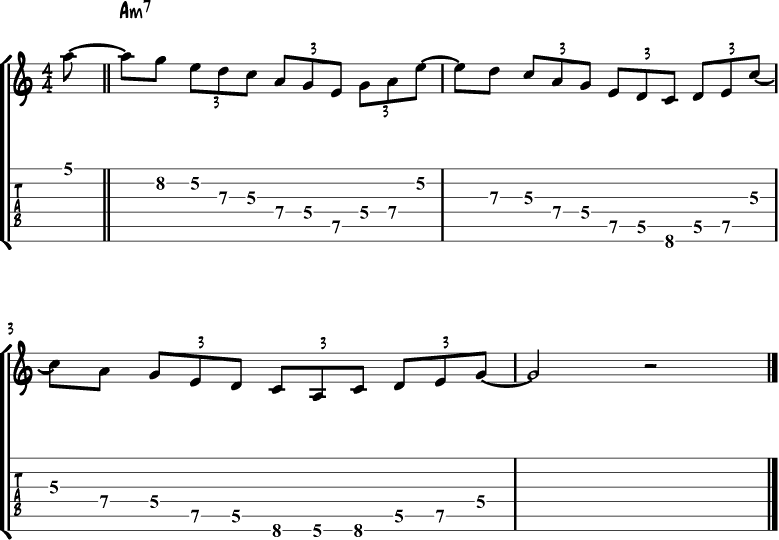
Minor Pentatonic Lick 2
The next pentatonic lick is a convenient way to go from low to high on the fretboard, using the minor pentatonic scale.

Minor Pentatonic Lick 3
This next lick combines 2 minor pentatonic scales over Am7:
- A minor pentatonic: 1 b3 4 5 b7
- B minor pentatonic: 9 11 5 6 1
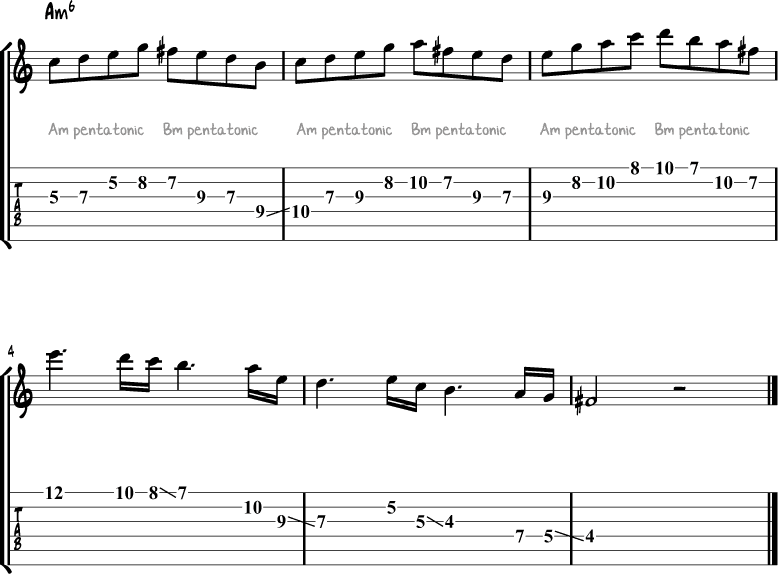
Minor Pentatonic Lick 4
The next minor pentatonic lick outlines the minor triad arpeggio at the start of the phrase (A-C-E).

Minor Pentatonic Lick 5
Here’s a simple blues-inspired lick.

Minor Pentatonic Lick 6
The next lick features a simple pattern that descends through the C minor pentatonic scale.
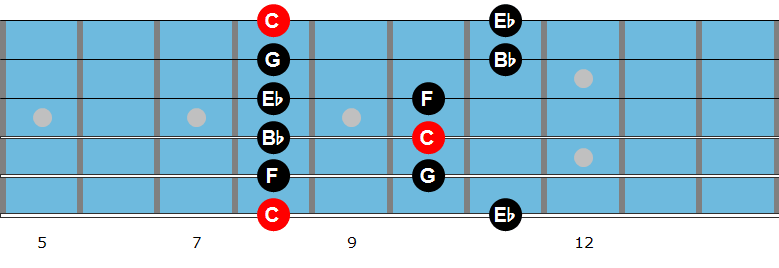

Applications of the Minor Pentatonic Scale in Jazz
The most obvious use of the minor pentatonic scale is playing the scale over a minor chord or a dominant 7th chord with the same root (for example, A minor pentatonic over Am7 or A7).
There are numerous other applications of the minor pentatonic scale though, as you can see in the table below.
For example:
- Playing an E minor pentatonic scale over Cmaj7, gives you a Cmaj9 sound.
- Playing an A minor pentatonic scale over Cmaj7 results in a C6/9 sound.
- …
| Chord | Pentatonic Scale | Note Functions | |||||
| Cmaj9 | E minor pentatonic |
|
|||||
| C6/9 | A minor pentatonic |
|
|||||
| Cmaj9#11 | B minor pentatonic |
|
|||||
| Cm11 | C minor pentatonic |
|
|||||
| Cm11 | G minor pentatonic |
|
|||||
| C7 | C minor pentatonic |
|
|||||
| C7alt | Eb minor pentatonic |
|
|||||
| C13sus4 | D minor pentatonic |
|
|||||
| C9sus4 | G minor pentatonic |
|
|||||
| Cm7b5 | F minor pentatonic |
|
Minor Pentatonic over ii V I Chord Progressions
Here’s an interesting way to use minor pentatonic scales over a 2-5-1 chord progression:
- Over Dm7: A minor pentatonic
- Over G7: Bb minor pentatonic
- Over Cmaj7: B minor pentatonic
Backing Track
Listen & Play Along
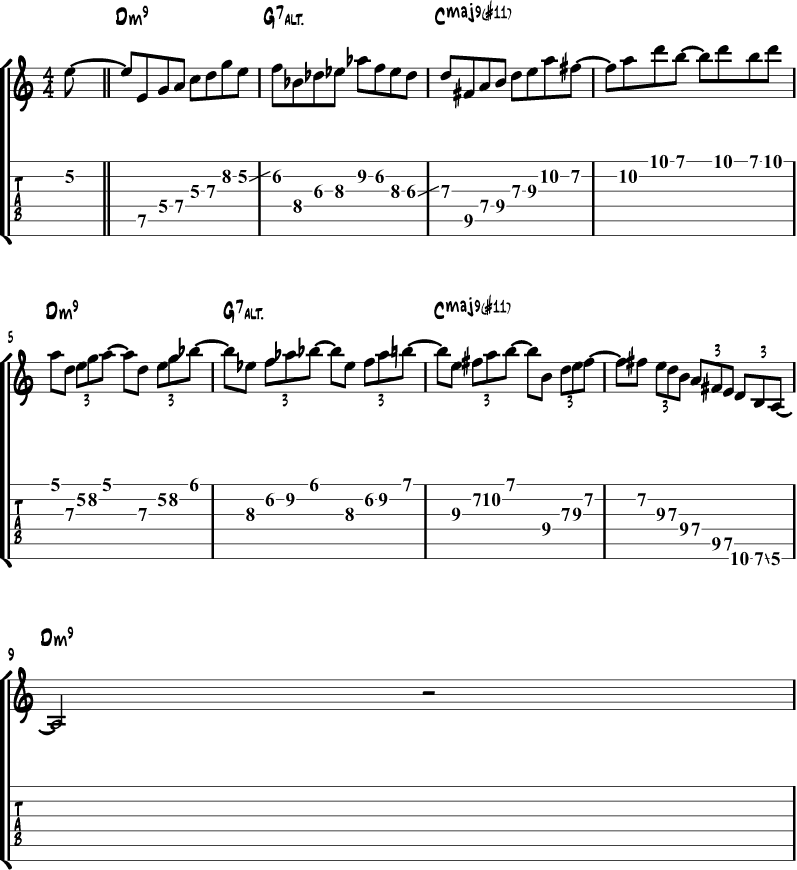
Minor Pentatonic Over Minor ii V I Chord Progressions
The minor pentatonic scale can also be used to play over minor 2-5-1s. In the next example, I play a G minor pentatonic scale over a 2-5-1 in C minor.
Backing Track
Listen & Play Along
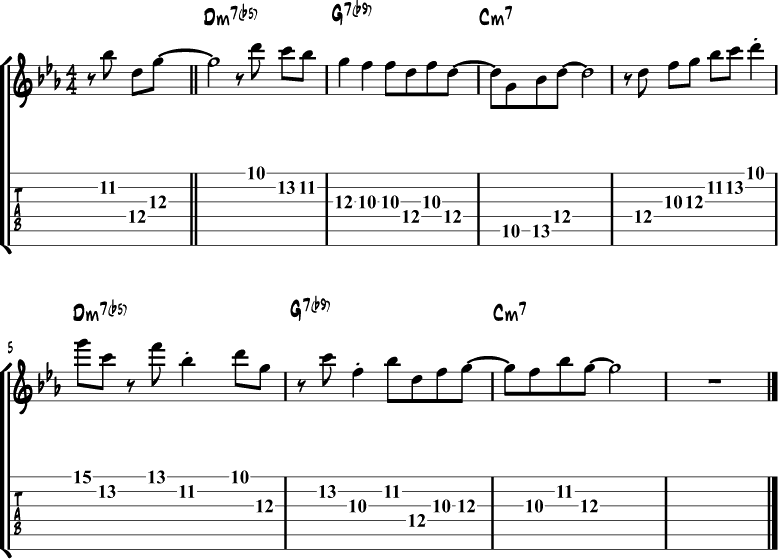
Sidestepping
Sidestepping is a technique in which you mix the pentatonic scale of the key you are playing in with a pentatonic scale that is a half tone higher.
For example: over an Am7 chord you mix an A minor pentatonic scale with a Bb minor pentatonic scale.
This results in an outside sound because the Bb minor scale creates a lot of dissonance, which is then resolved by going back to the A minor scale.
Listen & Play Along
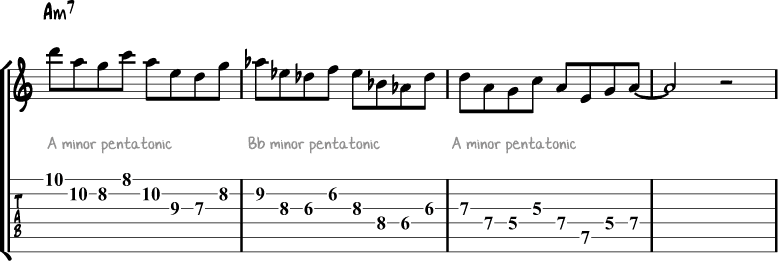
Minor Pentatonic Enclosures
The same techniques you use on arpeggios and scales, such as chromatic notes and enclosures, can also be applied to the minor pentatonic scale.
In the next example, I use enclosures to bring some variation to the A minor pentatonic scale.
Listen & Play Along

Minor Pentatonic Scale Songs
A lot of melodies in pop, blues, and jazz are built with a pentatonic scale. Here’s a selection of jazz standards that have a minor pentatonic melody.
Sunny – Bobby Hebb
Sunny is a famous R&B song written by Bobby Hebb in 1963. The song became popular in jazz circles because of Wes Montgomery‘s, and later Pat Martino‘s version.
The entire song is in the A minor pentatonic scale.
Backing Track
Listen & Play Along
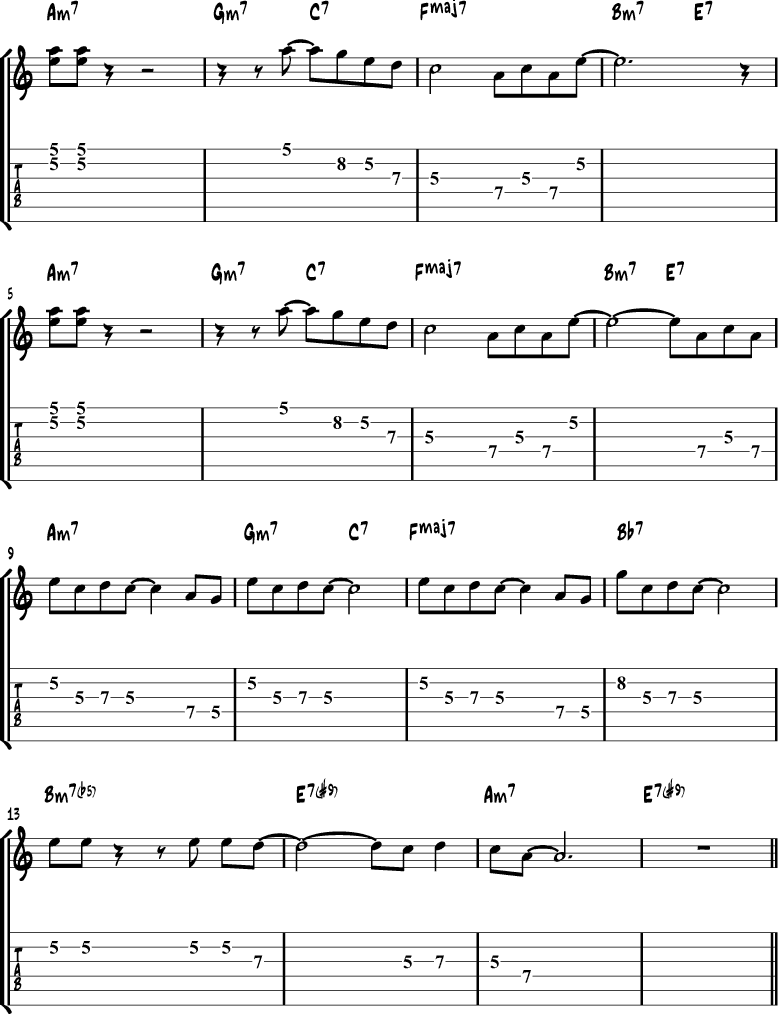
Chameleon – Herbie Hancock
Chameleon is a cool jazz funk classic, written and played by Herbie Hancock and his band on their album Head Hunters.
The theme uses the Bb minor pentatonic scale, which looks like this on the fretboard:

Here’s how Chameleon’s theme sounds on guitar:
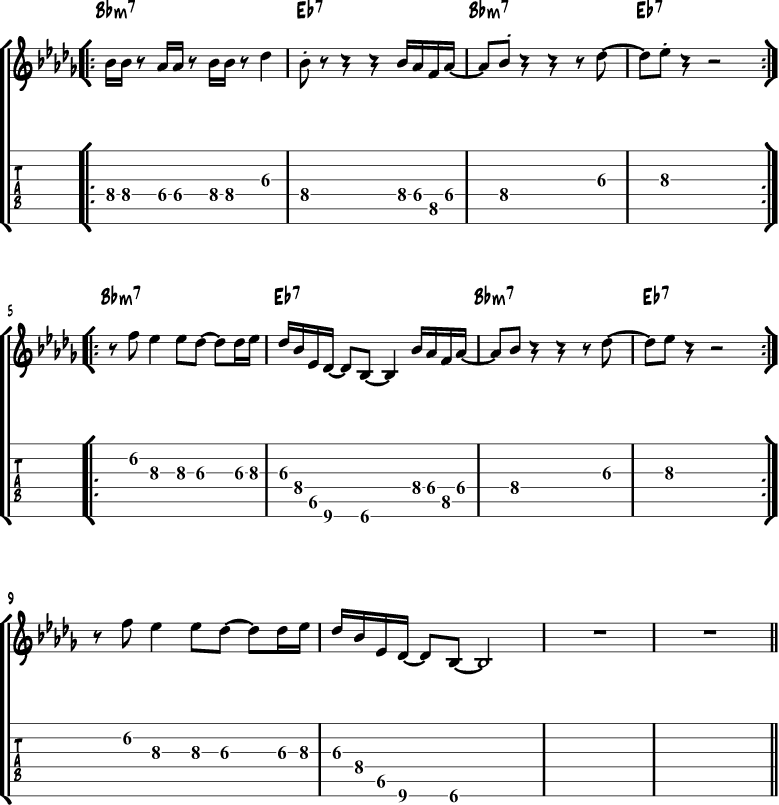
Alfie’s Theme – Sonny Rollins
Alfie’s Theme is a fun standard written and played by Sonny Rollins. The song is entirely in the Bb minor pentatonic scale.
Backing Track
Listen & Play Along
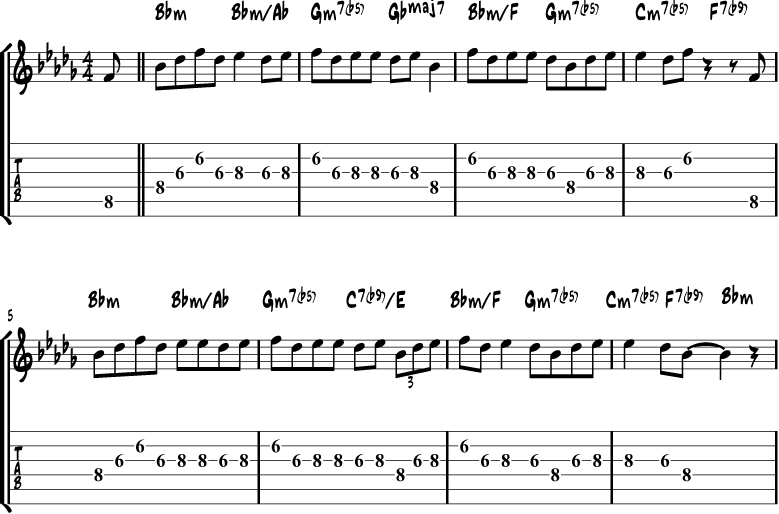
Bags’ Groove – Milt Jackson
Bags’ Groove is a standard written by vibraphonist Milt Jackson, whose nickname was Bags. The most famous version of Bags’ Groove was recorded by Miles Davis on his album Bags’ Groove from 1957.
Bags’ Groove theme is a repeating F minor pentatonic scale lick played over a blues in F.

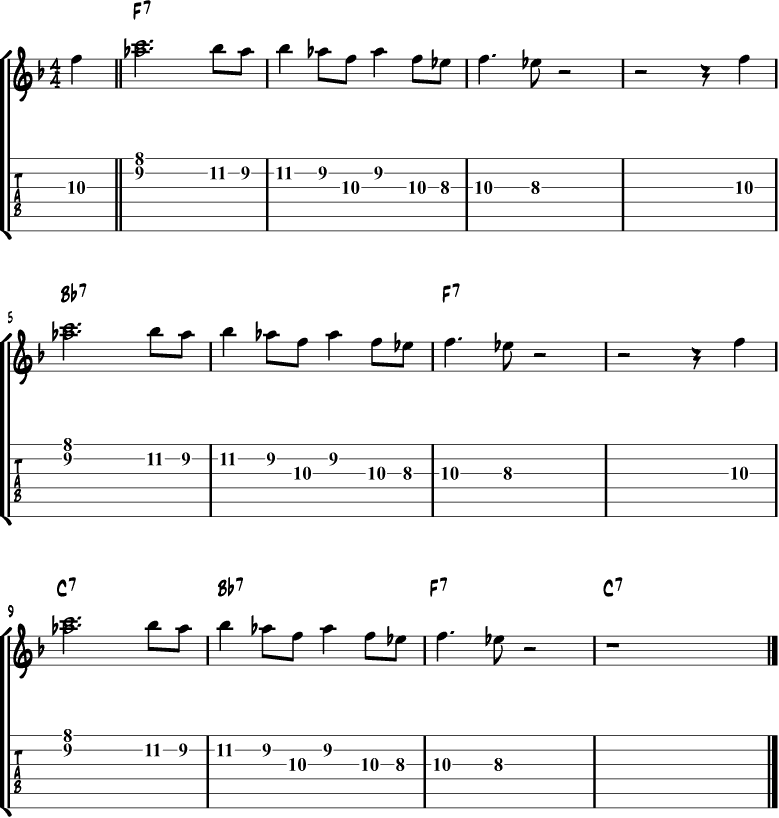
As you can see, though sometimes we associate the minor pentatonic scale with blues and rock solos, you can quickly and easily translate this sound from your rock background (if that’s where you come from), into your jazz guitar soloing ideas.
Let us know if you have questions by leaving a comment below…
More Guitar Scale Lessons
The post The Minor Pentatonic Scale appeared first on Jazz Guitar Online | Free Jazz Guitar Lessons, Licks, Tips & Tricks..
from Jazz Guitar Online | Free Jazz Guitar Lessons, Licks, Tips & Tricks. https://ift.tt/2LuEZKc

No comments:
Post a Comment